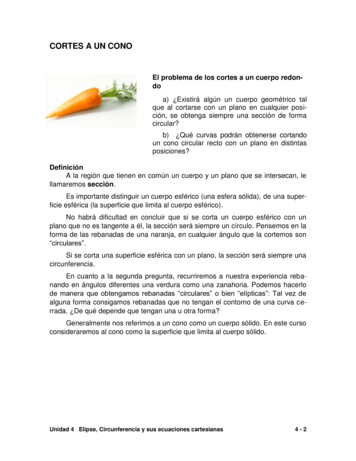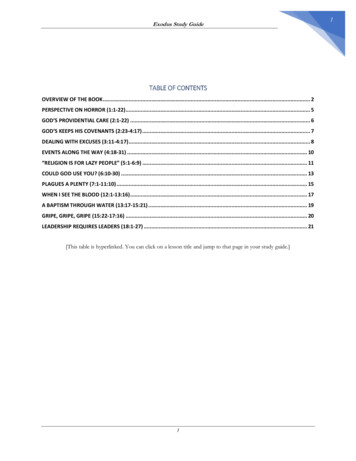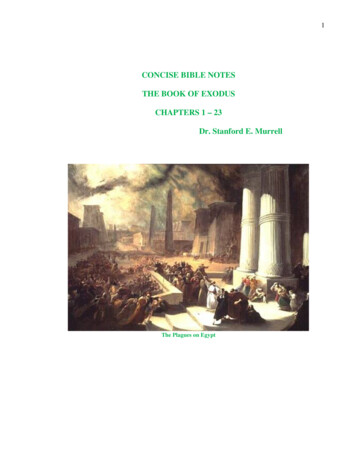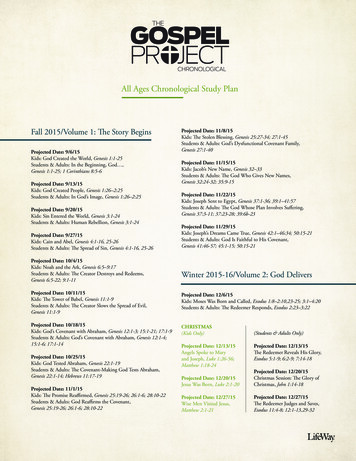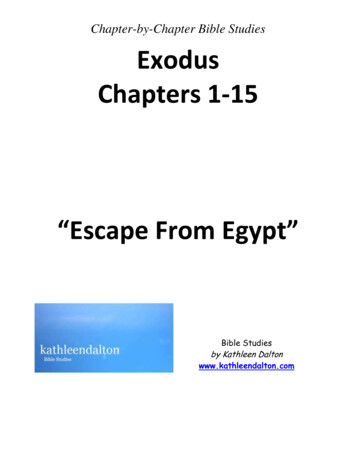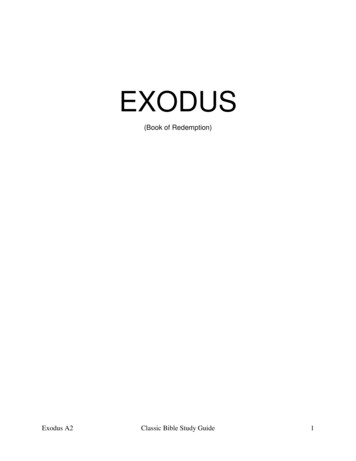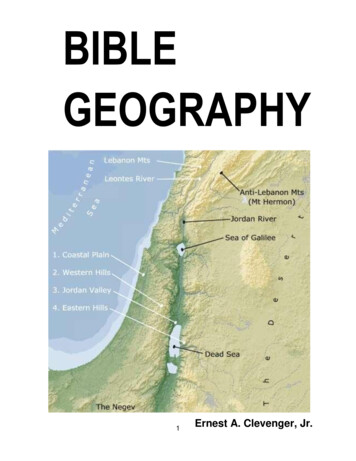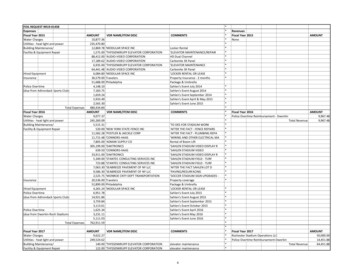
Transcription
Notes onExodus2 0 2 2 E d i t i o nDr. Thomas L. ConstableTITLEThe Hebrew title of this book (we'elleh shemot) originated from the ancientpractice of naming a Bible book after its first word or words. "Now theseare the names of" is a translation of the first two Hebrew words.1"The Hebrew title of the Book of Exodus, therefore, was toremind us that Exodus is the sequel to Genesis and that one ofits purposes is to continue the history of God's people as wellas elaborate further on the great themes so nobly introducedin Genesis."2Exodus cannot stand alone, in the sense that the book would not make asmuch sense without Genesis. The very first word of the book, translated"now," is a Hebrew conjunction that means "and." Other Old Testamentbooks that begin with this conjunction are: Joshua, Judges, Ruth, 1 and 2Samuel, 1 and 2 Kings, 2 Chronicles, Ezra, Nehemiah, and Esther.The English title "Exodus" is a transliteration of the Greek word exodus,from the Septuagint translation, meaning "exit," "way out," or "departure."The Septuagint translators gave the book this title because of the majorevent in it, namely, the Israelites' departure from Egypt."The exodus is the most significant historical and theologicalevent of the Old Testament "31Quotationsfrom the English Bible in these notes are taken from The New AmericanStandard Bible, 2020 edition, unless otherwise indicated.2Ronald Youngblood, Exodus, pp. 9-10.3Eugene H. Merrill, Kingdom of Priests, p. 57.Copyright Ó 2022 by Thomas L. Constable
Dr. Constable's Notes on Exodus22022 EditionDATE AND WRITERMoses, who lived from about 1525 to 1405 B.C., wrote Exodus (17:14;24:4; 34:4, 27-29). He could have written it, under the inspiration of theHoly Spirit, any time after the events recorded (after about 1444 B.C.). Hemay have written it during the year the Israelites camped at the base ofMt. Sinai. He might have done so during the 38-year period of wandering inthe wilderness, following the Israelites' failure to enter the land fromKadesh Barnea (cf. Num. 13-14; ca. 1443-1405 B.C.). On the other hand,he may have written it on the plains of Moab, just before his death (cf.16:35). We cannot pin down the date of writing definitely.These dates tie in with the date of the Exodus of the Israelites from Egypt,which will be discussed in my exposition of chapter 12.1The founding president of Brandeis University, Abram Sachar, wrote thefollowing about Moses, which articulates the skepticism of many scholarstoday:"Yet of his life, of his very existence, we have no conclusiveproof. Not a contemporaneous document, not a stele, not ashred of evidence, has been found to authenticate hishistoricity. Perhaps some day his existence, too, will bescientifically demonstrated, as Hammurabi's was, when, in1902, the tablets of his laws were discovered."2"It was the fad in the twentieth century to deny the historicalreality of the man Moses."31Seealso Tremper Longman III and Raymond B. Dillard, An Introduction to the OldTestament, pp. 65-69; John D. Hannah, "Exodus," in The Bible Knowledge Commentary:Old Testament, pp. 104-5. On the Mosaic authorship of Exodus, see my note on the writerof Genesis and the sources referred to there, in my notes on Genesis. Kenneth Kitchen,"The Old Testament in its Context: 2 From Egypt to the Jordan," Theological Students'Fellowship Bulletin (1971):4-8, also has helpful background information on the Mosaicauthorship of Exodus, Leviticus, Numbers, and Deuteronomy, as does Gleason L. Archer,"Old Testament History and Recent Archaeology from Moses to David," Bibliotheca Sacra127:506 (April-June 1970):99-106.2Abram Sachar, A History of the Jews, p. 16.3Walter C. Kaiser Jr., "Exodus," in Genesis-Leviticus, vol. 1 of The Expositor's BibleCommentary, revised ed., p. 336. He proceeded to give evidence for Moses' existence.
2022 EditionDr. Constable's Notes on Exodus3" most critics accept his [Moses'] historical existence, as amember of the Levi-Simon-Judah tribes, and, while discountingthe subsequent idealization of his character and career, placehim among the great religious leaders of all time."1SCOPEExodus embraces about 431 years of history: from the arrival of Jacob andhis family in Egypt (ca. 1876 B.C.) to the erection of the tabernacle in thewilderness of Sinai (ca. 1445 B.C.). However, 1:1-7 is a review of Jacob'sfamily. If we eliminate this section, the narrative resumes the story of theIsraelites where Genesis ends, after the death of Joseph. About 364 yearselapsed between the death of Joseph and the building of the tabernacle.The bulk of the book (chs. 3—40) deals with only two of those years, theyear before and the year after the Exodus from Egypt. The Exodus eventis clearly the focus of this book.The Israelites lived in Egypt 430 years (12:40). Genesis 15:13 has therounded number "400 years" as the total time of Israel's oppression inEgypt.2 It may be helpful to remember that about 400 years elapsedbetween the end of Malachi and the beginning of Matthew, and that about400 years elapsed between the end of Genesis and the beginning ofExodus.PURPOSE"The purpose of the Book of Exodus is to celebrate God'sgracious deliverance of His chosen people Israel from Egyptianslavery to the freedom of covenant relationship and fellowshipwith Him."31Sachar,2Seep. 20.the "Chronology Chart for Exodus" in John Davis, Moses and the Gods of Egypt, p.14.3Eugene H. Merrill, in The Old Testament Explorer, p. 41.
Dr. Constable's Notes on Exodus42022 EditionGENRELike Genesis, Exodus contains a mixture of literary genres, includingnarrative, poetry, legal, and cultic.1 As a whole, however, it seems best toclassify the whole book as theological instructional history.2IMPORTANCE"No other biblical book surfaces elsewhere in the OT asfrequently as the Book of Exodus does; in the NT only theBooks of Psalms and Isaiah are cited more, and that for thefairly obvious reasons of liturgy and messianism."3"The deliverance of Israel out of Egypt by Yahweh in the OldTestament is parallel in importance to the resurrection ofChrist in the New Testament. The historicity of these eventsis a critical foundation for a proper understanding of the restof the Bible."4OUTLINEI.The liberation of Israel 1:1—15:21A.God's preparation of Israel and Moses chs. 1—41.2.3.4.5.6.7.1HerbertThe growth of Jacob's family 1:1-7The Israelites' bondage in Egypt 1:8-22Moses' birth and education 2:1-10Moses' flight from Egypt to Midian 2:11-15Moses' life in Midian 2:16-25Moses' call 3:1—4:18Moses' return to Egypt 4:19-31M. Wolf, An Introduction to the Old Testament Pentateuch, p. 127.and Dillard, p. 723John I. Durham, Exodus, p. xxiii.4J. Daniel Hays, "An Evangelical Approach to Old Testament Narrative Criticism,"Bibliotheca Sacra 166:661 (January-March 2009):13.2Longman
2022 EditionB.2.3.4.5.6.7.2.3.4.5.The consecration of Israel as the covenant nation 12:128The death of the firstborn and the release of Israel12:29-36The exodus of Israel out of Egypt 12:37-42Regulations concerning the Passover 12:43-51The sanctification of the firstborn 13:1-16God's completion of Israel's liberation 13:17—15:211.2.3.II.Pharaoh's response to Moses and Aaron's initial request5:1— 6:1Moses and Aaron's equipment as God's messengers6:2—7:7The attestation of Moses and Aaron's divine mission 7:813The first three plagues 7:14—8:19The fourth, fifth, and sixth plagues 8:20—9:12The seventh, eight, and ninth plagues 9:13—10:29The proclamation of the tenth plague ch. 11God's redemption of His people 12:1—13:161.D.The journey from Succoth to Etham 13:17-22Israel's passage through the Red Sea ch. 14Israel's song of deliverance 15:1-21The adoption of Israel 15:22—40:38A.5God's demonstrations of His sovereignty chs. 5—111.C.Dr. Constable's Notes on ExodusGod's preparatory instruction of Israel 15:22—18:271.2.3.4.5.Events in the wilderness of Shur 15:22-27Quails and manna in the wilderness of Sin ch. 16The lack of water at Rephidim 17:1-7The hostility of the Amalekites 17:18-36The friendliness of Jethro the Midianite ch. 18
Dr. Constable's Notes on Exodus6B.The establishment of the Mosaic Covenant 19:1—24:111.2.3.4.5.C.3.4.5.6.7.8.9.10.The revelation of these directions 24:12-18Contributions for the construction of the sanctuary25:1-9The tabernacle furnishings 25:10-41The tabernacle structure ch. 26The tabernacle courtyard 27:1-19The investiture of the priests 27:20—28:43The consecration of the priests 29:1-37The service of the priests 29:38—30:38The builders of the tabernacle 31:1-11The sign of the Sabbath 31:12-18The breaking and renewing of the covenant chs. 32—341.2.3.E.Preparation for the Covenant ch. 19The Ten Commandments 20:1-17The response of the Israelites 20:18-21The stipulations of the Book of the Covenant 20:22—23:33The ratification of the Covenant 24:1-11Directions regarding God's dwelling among His people 24:12—31:181.2.D.2022 EditionThe failure of Israel ch. 32The re-establishment of fellowship ch. 33The renewal of the covenant ch. 34The construction and dedication of the objects used in Israel'sworship chs. 35—401.2.3.Preparations for construction 35:1—36:7Execution of the work 36:8—39:43The erection and consecration of the tabernacle ch. 40In an interesting and original chart of Exodus, Ted Grove suggested thefollowing structural outline of Exodus:11Tedwas a student in my Old Testament History I course in the spring of 1991.
Dr. Constable's Notes on Exodus2022 EditionI.Israel's liberation chs. 1—18A.B.Israel's affliction (Israel is Egypt's possession) 1:1—2:14Deliverance 2:15—18:27Ted saw the following chiastic structure in 2:15—18:27.AMidian: Moses' commission 2:15—4:28BEnemy: Egypt defeated 4:29—15:21CWater: bitter to sweet and 12 springs 15:22-27DC'B'Food: manna and quail ch. 16Water: out of rock 17:1-7Enemy: Amalek defeated 17:8-16A'Midian: Moses accepts wisdom ch. 18II.Israel's adoption chs. 19—40A.B.C.D.E.F.Covenant delivered 19:1—24:11Sanctuary planned 24:12—31:18Covenant broken ch. 32Covenant renewed chs. 33—34Sanctuary's construction 35:1—40:33Covenant sealed (Israel is God's possession) 40:34-38Ted also saw a chiasm in chapters 19—40:ACovenant delivered 19:1—24:11BTabernacle planned 24:12—27:21CPriestly instructions chs. 28—30DCraftsmen's direction 31:1-11ESabbath instructions 31:12-18FCovenant broken ch. 32F'Covenant renewed chs. 33—347
Dr. Constable's Notes on Exodus8E'D'C'B'A'2022 EditionSabbath reminded 35:1-3Craftsmen and construction 35:4—38:31Priests prepared ch. 39Tabernacle completed 40:1-33Covenant sealed 40:34-38The center of the first chiasm is the "manna." The center of the secondchiasm is the "tablets (covenant) of the Law." These were the two itemsGod instructed Moses to preserve in the ark of the covenant. Ted saw thekey verse of the book as 34:9.MESSAGEThe great contribution of this book is the revelation that Yahweh is thesovereign God who provides deliverance for man from the slavery in whichhe finds himself.The major teaching of Exodus is primarily threefold: the sovereignty of God,the salvation of man, and the methods by which the sovereign God affectsman's salvation.First, Exodus teaches the sovereignty of God.In Genesis, we learn that the only way we can realize the purpose for whichGod created us, is through faith in a trustworthy God that expresses itselfin obedience. In Exodus, we learn that the God with whom we can have arelationship is not only trustworthy, but also sovereign. This realizationshould produce within us the double effect of worship and obedience."Sovereignty" is the attribute of God that expresses the fact that Yahwehis the ultimate ruler of the universe. There is no one higher in authoritythan He. As Sovereign, He has all power. Sovereignty does not refer to howGod rules, the method by which He governs. In particular, it does not implythat God controls every detail of life immediately (directly). God exercisesHis sovereignty by allowing human beings certain freedoms. He does notcontrol people like puppets on strings, but as a father controls his children.
2022 EditionDr. Constable's Notes on Exodus9We have freedom, but within certain limits. A biblical definition ofsovereignty is very important."Sovereignty is not a property of the divine nature, but aprerogative arising out of the perfections of the SupremeBeing. If God be a Spirit, and therefore a person, infinite,eternal, and immutable in his being and perfections, theCreator and Preserver of the universe, He is of right itsabsolute sovereign."1We can see God's sovereignty clearly in His superiority over all the so-calledgods of Egypt. He displayed His great power in all of His activity (miraclesand 10 plagues), that resulted in the liberation of the Israelites, and Hisadoption of them as His special people. Scripture teaches both thesovereignty of God and the responsibility of man. No one has been able toexplain this mystery to the satisfaction of all of God's people, but theScriptures clearly teach both truths.Second, Exodus teaches the salvation of man.In Genesis, we see the need for salvation (i.e., the Fall and the repeatedfailures of mankind). Even people of faith need salvation (deliverance). InExodus, God initially revealed His method of salvation and explained theconsequences of salvation. Exodus teaches that God provides salvation forman. Man does not provide it for himself. It also reveals that manappropriates what God has provided by faith.Two activities become prominent as major expressions of faith in Exodus:worship and obedience. Worship and obedience are the God-ward and theman-ward expressions of faith, respectively. They are the opposite ofidolatry and self-assertiveness—two characteristics that are prominent inGenesis. God's instruction for Israel's obedience was the Mosaic Law. Hisinstruction for her worship was the tabernacle. Much of Exodus deals withthe Mosaic Law and the tabernacle.True worship includes putting God at the center of life (cf. Rom. 6:12-13;12:1-2). Worship was to characterize the Israelites nationally andpersonally. God illustrated the importance of placing Him at the center oflife by locating the ark of the covenant in the center of the tabernacle, andby placing the tabernacle in the center of the Israelite camp. Obedience1CharlesHodge, Systematic Theology, 1:440.
10Dr. Constable's Notes on Exodus2022 Editionconsists of arranging all the parts of life in proper relation to God, who isat the center. If something in life does not orient toward God properly,there is disobedience. In this way, Exodus deepens the revelationconcerning obedience that God gave in Genesis.Third, Exodus teaches the methods by which the sovereign God affectsman's salvation:God's method of dealing with the human race generally (outside Israel) wasby creating a pattern, namely, the nation of Israel. God created the nationof Israel so He could demonstrate through Israel, for all other nations andpeoples to see, how glorious it can be to live under God's government.God's election of Israel was not the selection of a pet that God would favorat the expense of all others. It was the construction of a pattern. Israel wasto be a demonstration to all the world of how wonderful life can be underthe rule of Sovereign Yahweh (cf. 19:5-6).God's method of dealing with Israel was by revealing a person, namely,Himself. In many revelations to the Israelites, God sought to deepen theirunderstanding of, and appreciation for, Himself and His will. The specialprivilege of receiving this revelation was a blessing to them, and shouldhave resulted in their being a blessing to the whole world. Israel was to dothis by demonstrating how good it is to live under God's kingship.Some of the most important revelations of God occur in the followingpassages: 3:4-16; 6:2-8; 19:3-6; 20:1-7; 24:1, 9-11; 34:5-8; and 40:3435. They are not all different, but God intended them to have thecumulative effect of enriching the Israelites' concept of Himself. They cameto the people like waves beating on the shore. All the details of the MosaicCode, which begins in Exodus and continues through Numbers, reinforcethe main point of this revelation, which is the character of God. Look forthis revelation as you read Exodus 20—Numbers 10.God's method of dealing with individuals was by providing opportunities andchoices. We can see this most easily in God's dealings with the two majorcharacters in Exodus: Moses and Pharaoh. God's method of dealing withboth men was the same, but their responses were different and,consequently, so were their fates.Pharaoh was a strong, worldly-wise leader who acted wholly by sight ratherthan by faith in Yahweh. He is typical of people of the world. God's method
2022 EditionDr. Constable's Notes on Exodus11of dealing with him was to give him opportunities to make the right choices,and so experience the blessing of God. Pharaoh chose not to trust God, andhis disobedience resulted in personal tragedy for himself and nationaltragedy for Egypt, which he led.Moses, on the other hand, was also a strong, wise leader, but he acted byfaith rather than by sight—eventually (Heb. 11:27). God's method ofdealing with him, in Exodus, was the same as His method of dealing withPharaoh. That is, He gave Moses opportunities to make the right choices,and so experience God's blessing. Moses chose to trust and obey God, andhis life is a story of personal triumph and national triumph for Israel, whichhe led.In both cases, God patiently worked with these representative individuals,and gently encouraged them to do His will. Moses developed into a noblecharacter, because he chose to submit to God's authority, even though hewas faulty, fearful, and failing. Pharaoh was a more admirable person insome worldly respects, but he sank into destruction, because he chose torefuse to submit to God's authority.Exodus teaches that individuals are personally responsible under God, andtheir choices determine their destinies. There is ample New Testamentevidence for this in John 1:12; 3:16, 36; 5:24; 6:29, 40, 47; 20:31; et al.Divine sovereignty does not negate human responsibility. Charles HaddonSpurgeon is reported to have said about the sovereignty/freedom paradox:"I never try to reconcile friends." These revelations harmonize.My father was a very wise man, as well as being in a place of authority overme as my father. He gave me a certain amount of freedom, but he stillcontrolled me. He knew how to "push my buttons." God does the samething with us, only perfectly.Many people, including many Christians, try to understand divine revelation(the Bible) within the parameters of human reason. They filter what theBible says through the grid of what they understand to be true andreasonable. This approach has led many people to reject the Bible, or partsof the Bible, as unreasonable, illogical, or unscientific.The other option is to let revelation sit in judgment on what is reasonable(cf. 1 Cor. 1:25). This is the approach of faith. (Really, both positions arefaith positions. We either have faith in what is generally accepted as true,
12Dr. Constable's Notes on Exodus2022 Editionor we have faith in what God has said is true.) I am not suggesting that weshould stop using our minds when reading and interpreting Scripture, butwe should filter all information through the grid of Scripture. This is whatPaul was talking about when he wrote about renewing our minds (Rom.12:2). Essentially the question is, "Which is more reliable: revelation orreason?" We believe revelation is, because it is the Word of God.God, in His infinite wisdom and knowledge, has revealed only a portion oftotal reality. Human beings, in our fallen finiteness and limitedunderstanding, can only understand a portion of what He has revealed, notall of reality. God has made His revelation available to people in nature andin Scripture. In nature, He has revealed His power and deity—so much sothat every human being with normal mental powers can see that there is aGod (Ps. 19; Rom. 1). In Scripture, God has revealed His plan of salvation.Trying to fit all of revelation into a rational system is an exercise in futility.It is like trying to pour the Pacific Ocean into a one-gallon jug. Thereforewe must humble ourselves before God, and submit our reasons to Hisrevelation, rather than living the other way around.If we look at the record of God's activity in Exodus, we see progress. Theunbelief of His enemies does not frustrate Him. His ultimate purposes forIsrael came to fruition. However, if we look at the record of man's activityin this book, we see failure. Even Moses, Aaron, and the Israelites, whotrusted God, repeatedly failed. We observe this in the lives of thecharacters in Genesis as well.While man constantly falls short of what God requires, human failure doesnot frustrate God's ultimate purposes. This proves that God is indeedsovereign.In Genesis, we see the importance of faith in God for success in life. InExodus, we see that true faith manifests itself in worship of God andobedience to God.11Adapted45.from G. Campbell Morgan, Living Messages of the Books of the Bible, 1:1:29-
2022 EditionI.Dr. Constable's Notes on Exodus13THE LIBERATION OF ISRAEL 1:1—15:21"The story of the first half of Exodus, in broad summary, isRescue. The story of the second half, in equally broadsummary, is Response, both immediate response andcontinuing response. And binding together and undergirdingboth Rescue and Response is Presence, the Presence ofYahweh from whom both Rescue and Response ultimatelyderive."1"In recent years a popular theological movement, both inAmerican and Latin American countries, has been 'liberationtheology.' This is no mere academic movement. In fact, mostAmericans who are tuned in to their culture can see occasional,albeit veiled, references to it. Although there are differingnuances of liberation theology (varying from theologian totheologian or from issue to issue), what they all have incommon is the notion that God is, without qualification, on theside of the oppressed and that relief from oppression is thetrue goal of all Christian work. "Liberation theology tends to overlook the real purpose forwhich Israel was delivered. Moses does not say, 'Let my peoplego,' but 'Let my people go, so that they may worship me inthe desert' (7:16)."2A.GOD'S PREPARATION OF ISRAEL AND MOSES CHS. 1—41.The growth of Jacob's family 1:1-7The purposes of this section are three at least:1Durham,p. xxiii.Enns, Exodus, pp. 143-44. For an introduction to Liberation Theology, see Wolf,pp. 130-31.2Peter
Dr. Constable's Notes on Exodus142022 Edition1.These verses introduce the Israelites ("sons of Israel") who are thefocus of attention in Exodus.2.They also tie the Israelites back to Jacob, and explain their presencein Egypt.3.This section also accounts for the numerical growth of the Israelites,during the 360 years that elapsed between Genesis and Exodus,following Joseph's death and preceding Moses' birth.Moses used the rounded number "70" for the total number of Jacob'sdescendants when the patriarch entered Egypt (v. 5; cf. Gen. 46:27).1 Hispurpose was to contrast the small number of Israelites that entered Egypt,with the large number that existed when Moses was born, which was abouttwo million individuals (cf. 12:37; 38:26; Num. 1:45-47). It is quite easy toprove mathematically that Jacob's family of 70 that moved into Egypt,could have grown into a nation of two million or more individuals in 430years.2The fruitfulness (prosperity and fast growth) of the Israelites in Goshen,and their vast increase in number ("multiplied"), was due to God's blessing,as He was fulfilling His promises to the patriarchs (v. 7; cf. Gen. 22:17;32:12).2.The Israelites' bondage in Egypt 1:8-22This pericope (section of verses) serves a double purpose: It introduces therigorous, slave-driving conditions under which the Egyptians forced theIsraelites to live, and it sets the stage for the birth of Moses.1:8-141ForThe "new king" referred to (v. 8) may have been Ahmose (Gr.Amosis), who founded the eighteenth dynasty and the NewKingdom Period, and ruled from 1570 to 1546 B.C.3 However,good, short histories of Egypt, see Hannah, pp. 105-7; Youngblood, pp. 20-25, orSiegfried Schwantes, A Short History of the Ancient Near East, pp. 51-109. For a briefhistory of Egypt through the time of David and Solomon, see Charles H. Dyer and GregoryA. Hatteberg, The New Christian Traveler's Guide to the Holy Land, pp. 158-64.2See Ralph D. Winter, "The Growth of Israel in Egypt (The Phenomenon of ExponentialGrowth)," a paper published by the Institute of International Studies, Pasadena, Ca., 14April 1993.3Joseph P. Free, Archaeology and Bible History, p. 84.
2022 EditionDr. Constable's Notes on Exodus15he was probably one of Ahmose's immediate successors:Amenhotep I, or, most likely, Thutmose I. (This was not thefamous Tutankhamen, King Tut, who ruled Egypt from 1360to 1351 B.C., during the Judges Period of Israel's history. Norwas he the much-later Pharaoh who was confronted by Mosesand given the famous ultimatum, "Let My people go.")However, the identity of this new king, Israel's oppressor, wasnot important enough for the writer to identify by name. Hisemphasis was rather on the oppression of the Israelites, theawful condition out of which God would redeem His people.Leon Wood and John Rea argued that this king was one of theHyksos rulers.1 Ahmose was the first native Egyptian Pharaohafter many years of Hyksos rule.Preceding Ahmose was a series of Hyksos rulers.2 The nameHyksos probably means "rulers of foreign lands,"3 though theancient Egyptian historian Manetho wrote that it meant"shepherd-kings."4 The Hyksos were a Semitic people from thenorthern part of the Fertile Crescent—from the area aroundPaddan-aram, where Laban, Leah, and Rachel originally lived(cf. Gen. 48:7)."Aryan [people speaking an Indo-Europeanlanguage] elements were discovered among theHyksos, who founded a great empire in Syria andfor many years held Egypt."5The Hyksos had invaded Egypt about 1670 B.C., and they ruleduntil Ahmose expelled them. The New Kingdom Period (ca.1LeonJ. Wood, A Survey of Israel's History, pp. 34-38; John Rea, "The Time of theOppression and the Exodus," Journal of the Evangelical Theological Society 3 (1960):5961.2See Aharon Kempinski, "Jacob in History," Biblical Archaeology Review 14:1 (JanuaryFebruary 1988):42-47.3John Van Seters, The Hyksos, p. 187.4Cited by Flavius Josephus, Against Apion, 1:14. See also Jack Finegan, Light from theAncient Past, p. 94.5A. T. Olmstead, History of the Persian Empire, p. 11.
Dr. Constable's Notes on Exodus162022 Edition1570-1085 B.C.) that Ahmose inaugurated was the period ofgreatest imperial might in Egypt's long history.MEDITERRANEAN SEAZoan(Tanis)LOWEREGYPT100 NANCIENTEGYPTGULF OFSUEZUPPEREGYPTTell el AmarnaGULF OFAQABANMt. Horeb(Sinai)RED SEATo summarize, Jacob moved from Canaan to Egypt about1876 B.C., during the reign of Pharaoh Senusert III (Sesostris,ca. 1878-1871).1"His predecessor, Senusert II (1894-1878), wouldhave been the man whose dream Josephinterpreted and who made Joseph his vizier."2The Hyksos invaded Egypt about 1670, approximately 200years after Jacob relocated there. Ahmose expelled the Hyksosabout 1570, ending their 100-year domination of Egypt.Moses was born about 1525, or about 50 years after Ahmosehad restored Egyptian sovereignty."In the Late Bronze Age [ca. 1500-1200 B.C.],Egypt entered her period of Empire, during whichshe was unquestionably the dominant nation of1Wood,2Ibid.,pp. 113-14.p. 114.
2022 EditionDr. Constable's Notes on Exodus17the world. Architects of the Empire were thePharaohs of the Eighteenth Dynasty, a house thatwas founded as the Hyksos were expelled fromEgypt and that retained power for some twohundred and fifty years (ca. 1570-1310), bringingto Egypt a strength and a prestige unequaled inall her long history."1The title Pharaoh means "Great House." It originally designatedthe Egyptian king's residence and household. It became a titlefor the king himself, for the first time, in the eighteenthdynasty.2The implication of the statement that Pharaoh "did not knowJoseph," in the Hebrew text, is that he did not know himbecause he did not want to know about him (v. 8). It seemsthat the early kings of the eighteenth dynasty wanted tosolidify control of Egypt in the hands of native Egyptians. Aftera long period of control by foreigners, they did not want toacknowledge the greatness of Joseph, who was, of course, alsoa foreigner and a Semite."Forgetfulness of Joseph brought the favourshown to the Israelites by the kings of Egypt to aclose."3Identifications of Significant Pharaohs after Josephand in Exodus 4SECOND INTERMEDIATE PERIOD (dynasties 15-16; ca. 1674-1567 B.C.).Capital: Avaris (Raamses). Period of Hyksos rule.NEW KINGDOM (dynasties 17-20; ca. 1570-1085 B.C.). Capital: Tanis(Zoan). Period of imperial supremacy.1JohnBright, A History of Israel, p. 98.C. Kaiser Jr., "Exodus," in Genesis-Numbers, vol. 2 of The Expositor's BibleCommentary, p. 288.3C. F. Keil and Franz Delitzsch, Biblical Commentary on the Old Testament: Pentateuch,1:421.4Based on the Cambridge Ancient History. All identifications are probable. See alsoFinegan, ch. 2: "The Panorama of Egypt."2Walter
18Dr. Constable's Notes on Exodus2022 EditionAhmose (Amosis; 1570-1546 B.C.; 1st Pharaoh of 18th dynasty)expelled the Hyksos and re-established native Egyptian rule.Amenhotep I (1546-1526 B.C.; 2nd Pharaoh of 18th dynasty)Thutmose I (Thutmosis I; 1525-ca. 1512 B.C.; 3rd Pharaoh of 18thdynasty) practiced genocide on Hebrew male babies (Exod. 1:1522).Hatshepsut (1503-1482 B.C.; 5th Pharaoh of the 18th dynasty) wasthe daughter of Pharaoh Thutmose I who drew Moses out of the Nileand later ruled as Queen (Exod. 2:5).Thutmose III (1504-1450 B.C.; 6th Pharaoh of the 18th dynasty)was the Pharaoh of the oppression who tried to kill Moses and fromwhom
The Hebrew title of this book (we'elleh shemot) originated from the ancient practice of naming a Bible book after its first word or words. "Now these are the names of" is the translation of the first two Hebrew words. "The Hebrew title of the Book of Exodus, therefore, was to remind us that
